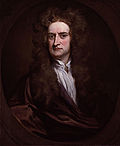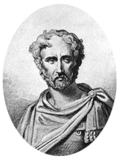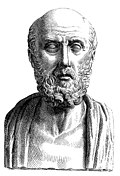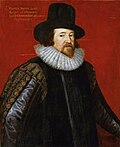Portal:History of science
The History of Science Portal
The history of science covers the development of science from ancient times to the present. It encompasses all three major branches of science: natural, social, and formal. Protoscience, early sciences, and natural philosophies such as alchemy and astrology that existed during the Bronze Age, Iron Age, classical antiquity and the Middle Ages, declined during the early modern period after the establishment of formal disciplines of science in the Age of Enlightenment.
Science's earliest roots can be traced to Ancient Egypt and Mesopotamia around 3000 to 1200 BCE. These civilizations' contributions to mathematics, astronomy, and medicine influenced later Greek natural philosophy of classical antiquity, wherein formal attempts were made to provide explanations of events in the physical world based on natural causes. After the fall of the Western Roman Empire, knowledge of Greek conceptions of the world deteriorated in Latin-speaking Western Europe during the early centuries (400 to 1000 CE) of the Middle Ages, but continued to thrive in the Greek-speaking Byzantine Empire. Aided by translations of Greek texts, the Hellenistic worldview was preserved and absorbed into the Arabic-speaking Muslim world during the Islamic Golden Age. The recovery and assimilation of Greek works and Islamic inquiries into Western Europe from the 10th to 13th century revived the learning of natural philosophy in the West. Traditions of early science were also developed in ancient India and separately in ancient China, the Chinese model having influenced Vietnam, Korea and Japan before Western exploration. Among the Pre-Columbian peoples of Mesoamerica, the Zapotec civilization established their first known traditions of astronomy and mathematics for producing calendars, followed by other civilizations such as the Maya.
Natural philosophy was transformed during the Scientific Revolution in 16th- to 17th-century Europe, as new ideas and discoveries departed from previous Greek conceptions and traditions. The New Science that emerged was more mechanistic in its worldview, more integrated with mathematics, and more reliable and open as its knowledge was based on a newly defined scientific method. More "revolutions" in subsequent centuries soon followed. The chemical revolution of the 18th century, for instance, introduced new quantitative methods and measurements for chemistry. In the 19th century, new perspectives regarding the conservation of energy, age of Earth, and evolution came into focus. And in the 20th century, new discoveries in genetics and physics laid the foundations for new sub disciplines such as molecular biology and particle physics. Moreover, industrial and military concerns as well as the increasing complexity of new research endeavors ushered in the era of "big science," particularly after World War II. (Full article...)
Selected article -
Science in the ancient world encompasses the earliest history of science from the protoscience of prehistory and ancient history to late antiquity. In ancient times, culture and knowledge were passed through oral tradition. The development of writing further enabled the preservation of knowledge and culture, allowing information to spread accurately.
The earliest scientific traditions of the ancient world developed in the Ancient Near East, with Ancient Egypt and Babylonia in Mesopotamia. Later traditions of science during classical antiquity were advanced in ancient Persia, Greece, Rome, India, China, and Mesoamerica. Aside from alchemy and astrology that waned in importance during the Age of Enlightenment, civilizations of the ancient world laid the roots of modern sciences. (Full article...)
Selected image
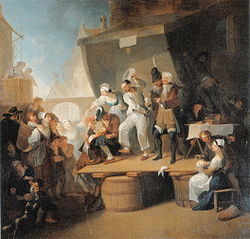
Der Quacksalber (The Quack) is a painting (oil on wood, 53 x 56 cm) by Franz Anton Maulbertsch, from some time before 1785. The subject, of course, is quackery—the peddling of unproven, and sometimes dangerous, medicines, cures or treatments— which has existed throughout the history of medicine. In ancient times, theatrics were sometimes mixed with actual medicine to provide entertainment as much as healing. Quack medicines often had little in the way of active ingredients, or had ingredients which made a person feel good, such as what came to be known as recreational drugs. Morphine and related chemicals were especially common, being legal and unregulated in most places at the time. Arsenic and other poisons were also included.
Did you know
... that the Merton Thesis—an argument connecting Protestant pietism with the rise of experimental science—dates back to Robert K. Merton's 1938 doctoral dissertation, which launched the historical sociology of science?
...that a number of scientific disciplines, such as computer science and seismology, emerged because of military funding?
...that the principle of conservation of energy was formulated independently by at least 12 individuals between 1830 and 1850?
Selected Biography -
Francis Willughby (sometimes spelt Willoughby, Latin: Franciscus Willughbeius) FRS (22 November 1635 – 3 July 1672) was an English ornithologist, ichthyologist and mathematician, and an early student of linguistics and games.
He was born and raised at Middleton Hall, Warwickshire, the only son of an affluent country family. He was a student at Trinity College, Cambridge, where he was tutored by the mathematician and naturalist John Ray, who became a lifetime friend and colleague, and lived with Willughby after 1662 when Ray lost his livelihood through his refusal to sign the Act of Uniformity. Willughby was elected as a Fellow of the Royal Society in 1661, then aged 27. (Full article...)
Selected anniversaries
- 1620 - Birth of John Graunt, English statistician and founder of the science of demography (d. 1674)
- 1656 - Death of Thomas Fincke, Danish mathematician and physicist (b. 1561)
- 1899 - Birth of Oscar Zariski, Russian-born mathematician (d. 1986)
- 1916 - Ernest Shackleton and five men of the Imperial Trans-Antarctic Expedition launch a lifeboat from uninhabited Elephant Island in the Southern Ocean to organise a rescue for ice-trapped ship Endurance
- 1947 - Birth of Roger D. Kornberg, American chemist, Nobel-prized
- 1960 - Death of Max von Laue, German physicist, Nobel Prize laureate (b. 1879)
- 1964 - Death of Gerhard Domagk, German bacteriologist, recipient of the Nobel Prize in Physiology or Medicine (declined) (b. 1895)
- 1990 - STS-31: The Hubble Space Telescope is launched by the Space Shuttle Discovery
Related portals
Topics
General images
Subcategories
Things you can do
Help out by participating in the History of Science Wikiproject (which also coordinates the histories of medicine, technology and philosophy of science) or join the discussion.
Associated Wikimedia
The following Wikimedia Foundation sister projects provide more on this subject:
-
Commons
Free media repository -
Wikibooks
Free textbooks and manuals -
Wikidata
Free knowledge base -
Wikinews
Free-content news -
Wikiquote
Collection of quotations -
Wikisource
Free-content library -
Wikiversity
Free learning tools -
Wiktionary
Dictionary and thesaurus





